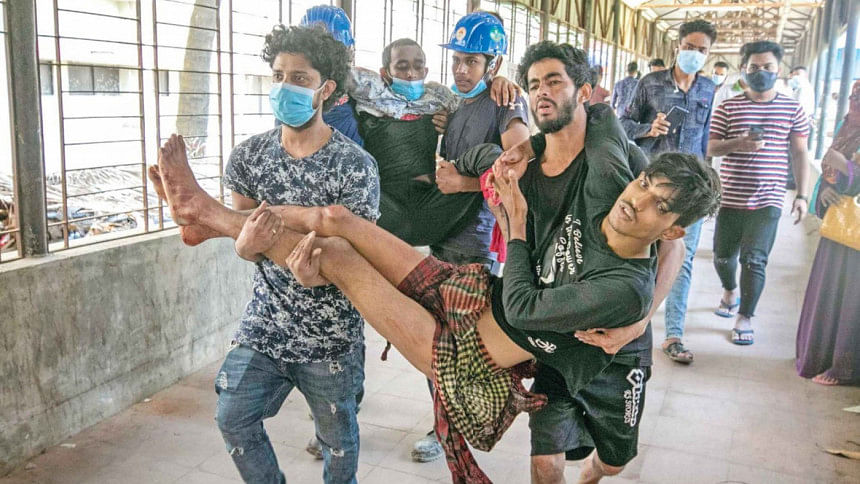Does anyone care about the Banshkhali Power Plant workers?

On April 17, police opened fire at the Banshkhali Power Plant workers. They were asking for something very simple—payment of due wages, increased wages, reduction of working hours to half days on Friday and break during iftar. Whether we choose to view these requirements as their "demands" or "rights" depends on what we think should be the minimum standard of living for a worker. So far at least seven workers have died as a result of being shot by the police. In the aftermath of this all-too-familiar tragedy, we need to question why usually it is the workers who get penalised instead of the perpetrators/corporations.
The backdrop of the Banshkhali power plant is plagued with a history of deceit and persecution against the working-class locals. Yet, the plant has historically received support from the state authorities especially while acquiring lands, (Kallol Mustafa, "Banshkhali Coal Power Plant Propaganda and Reality", The Daily Star, April 13, 2016) rather than being probed for the reasons that are resulting in the killing of innocent people.
Since 2016, 10 people have been killed by the police during various protests connected with the Banshkhali Power Plant. Farming and fishing were the predominant means of earning for the Banshkhali locals prior to the possibility of the power plant damaging the biodiversity of the area. Time and again thousands of locals have risen to the occasion to protest its establishment, since not enough was done by the government to ensure the security of their livelihood.
In 2016, police killed four people while they were protesting land acquisition by the S Alam Group. Their land was, allegedly, acquired fraudulently by downplaying the number of households in the area to 150 from 7,000 (Kallol Mustafa, "Banshkhali Coal Power Plant Propaganda and Reality", The Daily Star, April 13, 2016). Furthermore, in 2017, another Banshkhali local was killed for demanding that the location of the power plant be shifted. These were actual human lives that were lost because they saw through the delusion of employment and development promised. They wanted to be heard. Instead, they were shot and killed while the wrongdoers faced no consequences, except perhaps offering some money to the deceased's family. This has always been a recurring theme. Despite continuing to grow richer by exploiting the labour of the poor, the wealthy walk off scot-free. The demands of the working class are usually simple—do not destroy their livelihood and if you do so, at least do not deprive them of their meagre entitlements.
Class inequality is mounting and will continue to do so, especially with the threat of climate change. Extraction of fossil fuel and coal-fired power plants are direct causes of climate change. In fact, many of the reasons for which the Banshkhali locals began objecting to the power plant in 2016 were the consequences of the changing local climate (i.e., negative impacts on their agricultural lands, health and aquatic life, etc.).
As the state continues to prioritise capitalist corporations over the poor people who will decisively be at the forefront of the climate crisis, it must expect similar movements from people as their concerns over shelter and livelihood will keep rising progressively. More often than not these situations are intensified by silencing the powerless working class unable to cope with the crisis instead of holding the corporations accountable for their illegality and deception. The pattern of protecting the corporations is hard to miss.
Similar parallels can be drawn with the way the government has imposed lockdown during the second wave of Covid-19. The seriousness of the ongoing pandemic was prematurely downplayed in March. When the infection rates increased alarmingly, with no practicable plans, the government imposed an inadequate lockdown. The current provision of lockdown shows that the factory workers getting the deadly virus is not something that worries the state. The mismanagement and oversight despite having a whole year to come up with contingency plans for the minimum wage workers clarify that the value attached to their life and health is less than that of their employers. Workers are expendable.
Those wielding monetary, or muscle power are generally the ones the state sides with. From submitting false reports to deceiving locals about the impact of the project, big corporations have harmed workers time and again. Yet, the workers are the ones termed "unruly" by the police for protesting, so much so that it is justified to fire at them.
To that end, it is also important to question the proportionality of firing 332 shots at an unarmed protest. The police stated that they fired bullets in self-defence and to protect property. While that is allowed under the Penal Code 1860, such defence (known legally as "private defence") undertaken for protection of a person or property must be proportionate to the perceived threat.
Police are allowed to act in self/private defence. However, they do not have the power to use disproportionate force. In case of an unarmed demonstration, it is irrational and disproportionate to skip teargas, rubber bullets and fire shotgun bullets directly. Illegality aside, such shooting is also unethical when the demonstrators are placed in a completely unfair situation.
We must not consider the police firing at this protest in isolation of the conduct of big corporations. They have misrepresented and misled the masses, duped the state offices with false reports, failed to obtain Environmental Impact Assessment, site clearance, environmental clearance (Anu Muhammad, "Scrap projects of destruction", The Daily Star, April 11, 2016). Against this extreme level of violations (Anu Muhammad, "No to projects of mass destruction", New Age, April 19, 2021), the workers have been shot on multiple instances while making completely legal requests. Why are they always confronted rather than being cooperated? While corporate owners continue to accumulate an obscene amount of wealth even during the pandemic, we have to ask why the state forces' wrath is used on the people who are literally going hungry rather than on employers who constantly fail their legal obligations.
When the state itself draws power from capitalist corporations rather than from its citizens, it naturally prioritises the benefit of the corporations over their workers, regardless of the corporations' defaults. There is a growing culture of repressing legitimate protests by using disproportionate force by the police, regardless of whether the protests are by unpaid workers or school children. Simply suspending or terminating such officers, if it is done at all, instead of treating it as a criminal violation of the law validates the use of disproportionate force and the killing of innocent citizens.
More than 3,500 people have been made accused in two cases filed over the incident. However, we have yet to see any measures being taken against the owners who were clearly at fault or against the police officers who used criminally disproportionate force. Considering the state's inaction and police's activities, can we honestly assure the working class that their rights matter? From now on the government should be wary of boasting about the rising GDP because while this economy unquestionably stands on the minimum wage workers' plight, they never receive any help to survive.
Anupoma Joyeeta Joyee is a Barrister-at-Law. Email: [email protected]

 For all latest news, follow The Daily Star's Google News channel.
For all latest news, follow The Daily Star's Google News channel. 



Comments